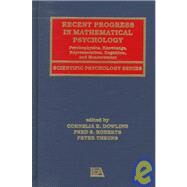Recent Progress in Mathematical Psychology : Psychophysics, Knowledge Representation, Cognition, and Measurement
, by Dowling, Cornelia E.; Roberts, Fred S.; Theuns, Peter- ISBN: 9780805819755 | 0805819754
- Cover: Hardcover
- Copyright: 7/1/1998
Mathematical psychology is an interdisciplinary area of research in which methods of mathematics, operations research, and computer science in psychology are used. Now more than thirty years old, the field has continued to grow rapidly and has taken on a life of its own. This volume summarizes recent progress in mathematical psychology as seen by some of the leading figures in the field as well as some of its leading young researchers. The papers presented in this volume reflect the most important current directions of research in mathematical psychology. They cover topics in measurement, decision and choice, psychophysics and psychometrics, knowledge representation, neural nets and learning models, and cognitive modeling. Some of the major ideas included are new applications of concepts of measurement theory to social phenomena, new directions in the theory of probabilistic choice, surprising results in nonlinear utility theory, applications of boolean methods in the theory of knowledge spaces, applications of neural net ideas to concept learning, developments in the theory of parallel processing models of response time, new results in inhibition theory, and new concepts about paired associate learning.






